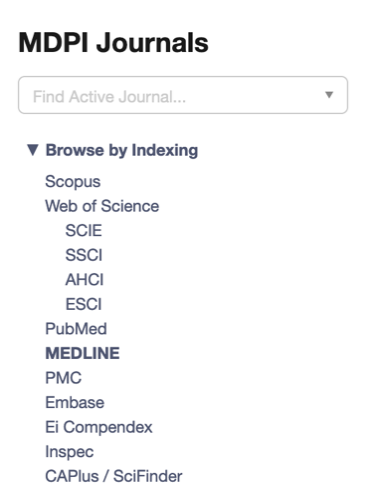
Journal Menu
► ▼ Journal Menu-
- Biomedicines Home
- Aims & Scope
- Editorial Board
- Reviewer Board
- Instructions for Authors
- Special Issues
- Topics
- Sections & Collections
- Article Processing Charge
- Indexing & Archiving
- Editor’s Choice Articles
- Most Cited & Viewed
- Journal Statistics
- Journal History
- Journal Awards
- Conferences
- Editorial Office
Journal Browser
► ▼ Journal BrowserNeed Help?
Announcements
8 August 2024
Meet Us at the Biomolecular Horizons 2024 Congress (BMH 2024), 22–26 September 2024, Melbourne, Australia

MDPI will attend the Biomolecular Horizons 2024 Congress, held from 22 to 26 September 2024 in Melbourne, Australia. This important forum will bring together three prestigious congresses, each with a strong history of attracting the bioscience and biotechnology communities to discuss and examine the latest developments and research:
- 26th Congress of the International Union of Biochemistry and Molecular Biology (IUBMB);
- 17th Congress of the Federation of Asian & Oceanian Biochemists & Molecular Biologists (FAOBMB);
- 22nd ComBio Conference (ComBio).
The overarching theme of the Biomolecular Horizons 2024 (BMH2024) Congress is “Discover, Create, Innovate”, which will be examined across the following key themes:
- Cell, Developmental and Stem Cell Biology;
- Biotechnology and Synthetic Biology;
- Microbial World;
- Cell Signalling and Metabolism;
- Genomics, Gene Regulation and Epigenetics;
- Bioinformatics, Computational Biology and Omics;
- Structural Biology and Biophysics;
- Molecular Basis of Disease;
- Molecular Physiology;
- Education.
The following MDPI journals will be represented:
- International Journal of Molecular Sciences;
- Biomolecules;
- Applied Biosciences;
- BioMedInformatics;
- Biomedicines;
- Cells;
- Applied Microbiology;
- BioTech;
- Biologics;
- Current Issues in Molecular Biology;
- Epigenomes;
- Genes;
- Journal of Developmental Biology;
- Journal of Molecular Pathology;
- Methods and Protocols;
- Muscles;
- Organoids;
- Signals;
- SynBio;
- Cardiogenetics.
If you are planning to attend the above conference, please feel free to stop by our booth. Our delegates look forward to meeting you in person to answer any questions that you may have. For more information about the conference, please visit the following link: https://www.bmh2024.com/.
8 August 2024
Meet Us at the 36th European Congress of Pathology (ECP 2024), 7–11 September 2024, Florence, Italy

Conference: 36th European Congress of Pathology (ECP 2024)
Date: 7–11 September 2024
Location: Florence, Italy
The European Society of Pathology (ESP) and the Italian Society of Pathology invite you to the 36th European Congress of Pathology (ECP 2024). It will take place in the Congress Center, Fortezza da Basso, of the wonderful city of Florence from 7 to 11 September 2024. Over the last years, the ECP has become the worldwide leading congress in pathology, and the Florence congress will increase this legacy with top contributions in diagnostic training, research, and education. For these few days in September, pathologists, clinicians, molecular biologists, geneticists, bioinformaticians, IT experts, and our industry partners will gather for ECP 2024 and make Florence the capital of pathology. You can view the detailed conference topics at https://www.esp-congress.org/scientific-programme/topics.html.
MDPI will be attending the 36th European Congress of Pathology (ECP 2024), and we welcome researchers from different backgrounds to visit and share their latest ideas with us.
The following MDPI journals will be represented:
- Diagnostics;
- Biomedicines;
- Neurology International;
- Pathophysiology;
- Gastroenterology Insights;
- IJMS;
- Cancers;
- CIMB;
- Antibiotics;
- Zoonotic Diseases;
- BioMed;
- Dermatopathology;
- Tomography;
- Sclerosis.
If you plan to attend this conference, please contact us online. Our delegates look forward to meeting you in person at booth #L150 and answering any questions that you may have. For more information about the conference, please visit the following website: https://www.esp-congress.org/.
7 August 2024
MDPI Insights: The CEO's Letter #14 - New Headquarters, Marketing, Poland

Welcome to the MDPI Insights: The CEO's Letter.
In these monthly letters, I will showcase two key aspects of our work at MDPI: our commitment to empowering researchers and our determination to facilitating open scientific exchange.
Opening Thoughts
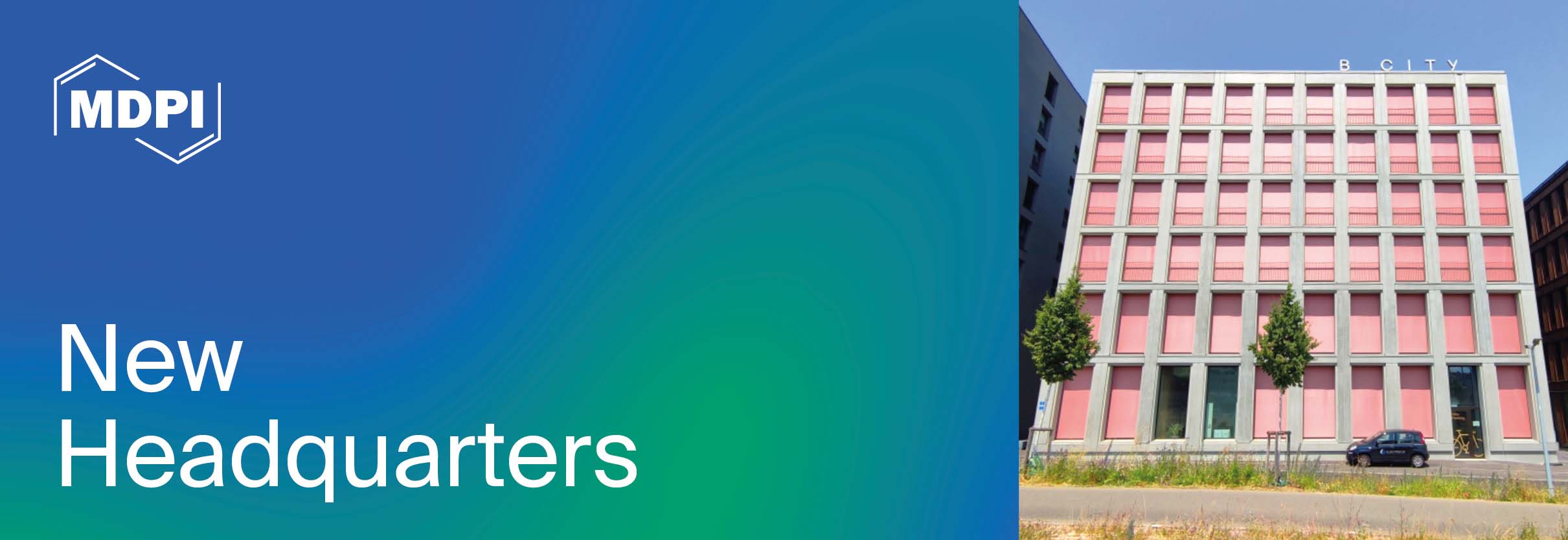
MDPI Moves to New Headquarters in Basel, Switzerland

I am excited to share that MDPI has moved to a new state-of-the-art office space in Basel, Switzerland. This move consolidates our operations by bringing together our two previously separated Basel offices into one central location.
We are always growing our talent pool and encourage you to view our Careers Page for the positions available in Basel and across our offices.
New Address: Grosspeteranlage 5, CH-4052 Basel, Switzerland
Effective Date: 1 July 2024
This new chapter in our company’s journey is designed to continue our mission of positioning MDPI as a leader in Open Access (OA) publishing, highlighting our commitment to making scholarly research accessible to everyone.

Boasting modern amenities, improved meeting and event spaces designed to support our growing needs, the new location provides a more collaborative and efficient working environment for our employees. The location offers convenient accessibility to public transportation and is situated near the Basel SBB railway station, with a variety of nearby services and amenities.
In fact, I can see the trains right outside of my window as I write these lines!
This move marks an exciting milestone in MDPI’s development, and I am confident that the new headquarters will serve as an inspiring and productive space for everyone. We also very much look forward to welcoming visitors here. You can read more about MDPI's history here.
“This new chapter continues our mission of positioning MDPI as a leader in OA publishing”
For Those New to MDPI
A pioneer in scholarly, Open Access publishing, MDPI has supported academic communities since 1996. MDPI is leading the transition to Open Science by making a greater proportion of the research conducted worldwide free and accessible to everyone. To date, over 3.5 million researchers have entrusted MDPI with publishing their scientific discoveries. MDPI’s editorial process is bolstered by a network of dedicated reviewers, a team of 6,000 professional, well-trained staff members, and an in-house article submission platform designed to ensure efficient processes within its 440 fully Open Access titles. MDPI supports more than 800 academic institutions worldwide, helping them adhere to national mandates while facilitating authors’ publication in fully compliant (CC BY) Open Access journals.
Impactful Research
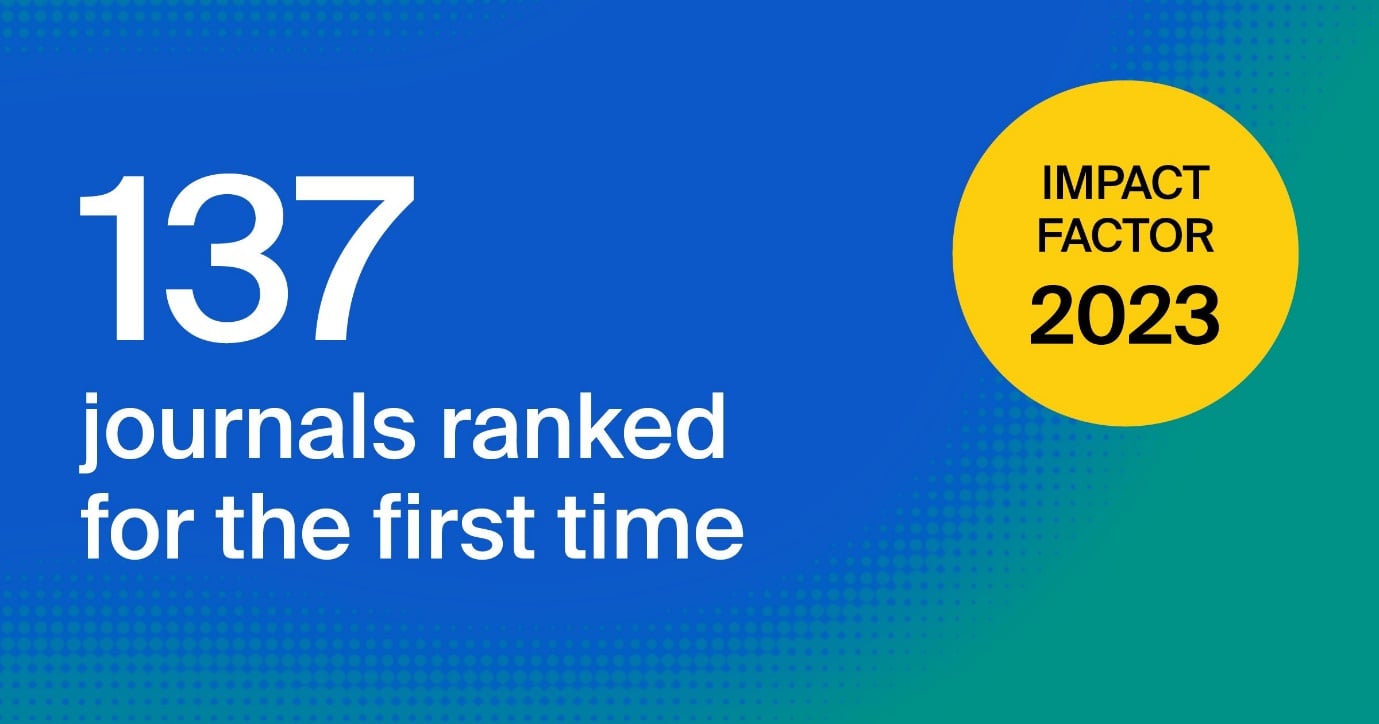
New and Emerging MDPI Journals Making an Immediate Impact
Unpacking some of the Impact Factor updates from the June CEO Letter, I wanted to dive a little deeper into the 137 MDPI journals which received Impact Factor for the first time.
Academic authors highly value efficient publishing processes, robust editorial support, and the opportunity to publish in high-impact journals. We are proud that our newly launched journals typically achieve coverage in the Emerging Sources Citation Index (ESCI) of the Web of Science within just a few years, with a median time of only three years from release to inclusion.
As part of our commitment to advancing academic research and providing high-quality OA publishing, we actively seek new research areas to expand our portfolio of journals. We have a proven track record of successfully establishing new journals.
Our dedicated teams excel in fostering dynamic editorial boards and working closely with Editors-in-Chief (EiC) to define the precise scope and focus of each new journal. Our expertise extends to collaborating with indexing services, ensuring that our journals comply with best practices and are indexed promptly in all relevant databases.
Emerging Titles Ranked for the First Time
Our commitment to excellence is reflected in the annual impact metrics released this past June. The latest edition of the Journal Citation Reports (JCR) showcases the integration of journals from the ESCI in the new unified category rankings, providing a simplified and more complete view of all journals within each subject category, including newly established titles.
Out of 137 new and developing MDPI journals ranked in the 2024 release, 79 are in the top half (Q1 or Q2) of their categories. Here is a breakdown of the number of MDPI’s ESCI-indexed journals by quartile in the JCR:
| Quartile | No. of journals |
| Q1 | 17 (12.4%) |
| Q2 | 62 (45.3%) |
| Q3 | 43 (31.4%) |
| Q4 | 15 (10.9%) |
| Not ranked (humanities-related journals) | 2 |
These rankings highlight our success in rapidly establishing high-impact new journals. Among those that made it directly into the top 25% of their category are the International Journal of Neonatal Screening, Journal of Xenobiotics, Polysaccharides, Smart Cities, and thirteen other journals.
You can browse MDPI journals by Indexing. Simply visit our Journals page and select from the list of Indexing bodies in the top left-hand corner.
Inside MDPI

MDPI Corporate Marketing Strategy and Team Meeting 2024
In July, I hosted the annual Corporate Marketing strategy and team-building activity with 15 of our team members.
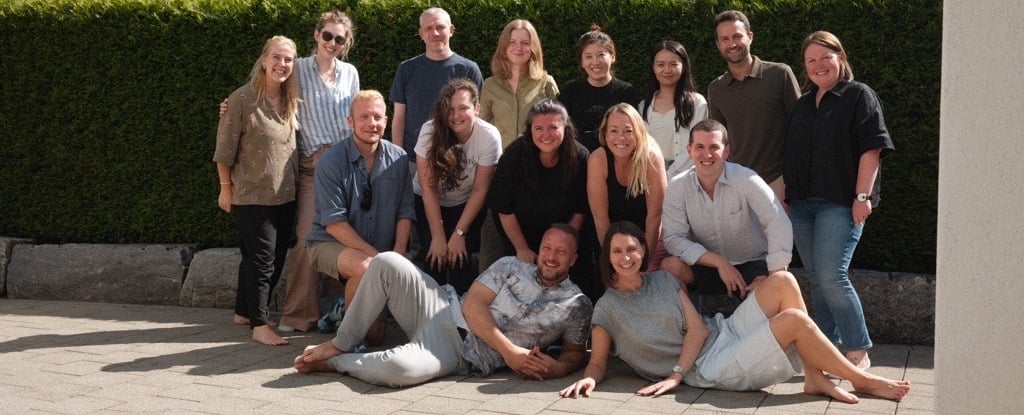
The aim was to align the Corporate Marketing strategy with MDPI's goal of becoming the world's most trusted OA publisher. While we provide a high-level publishing experience for our authors, as seen from our surveys, we need to keep building on our transparent and open communication to foster trust within the scholarly community and continue enhancing our reputation.
The Corporate Marketing team plays an important role as the mouthpiece for all our major activities within MDPI, especially those that model what it means to be a trusted partner. The purpose of the strategy meeting was to develop a feeling of trust in one another and an understanding of how to inspire trust in the stakeholders with whom we interact.
“We need to keep building on our transparent and open communication to foster trust within the scholarly community”

We conducted a set of activities to facilitate that sense of mutual trust and trustworthiness. Examples of some activities we worked on during this strategy-building event include:
- Exploring what trust means
- ‘Letter to self’
- ‘The brand I most trust’
- Most Trusted Academic Publisher
- ‘The brand I would like MDPI to become’
- ‘The 2029 MDPI Annual Report’
- Voice of Customer and Share of Voice – survey/data update on MDPI Brand Experience and Brand Perception
- Integrate Trust-Based Objective into Marketing Plan
- ‘Becoming the MDPI experience’
- ‘Trusting the next steps’
While two days is not enough to finalize a marketing strategy, it is sufficient to get everyone who attended into the mindset of the direction in which we are working. From here, we will develop a program with next steps on main projects, update communications, and collaborate with team leads to incorporate this approach into our work going forward.
As a marketing team, we can communicate our messages, but trust has to be built at every touchpoint in the stakeholder journey. Just talking about it isn’t enough. We need to be about it. That’s a role each of us plays, from editorial to IT, from marketing to HR. We must build trust from the inside out. It starts with each manager and resonates out via every team member.
As a company, our goal is to give all stakeholders with whom we interact – whether internal or external – the experience of working with an organization it can trust.
Coming Together for Science
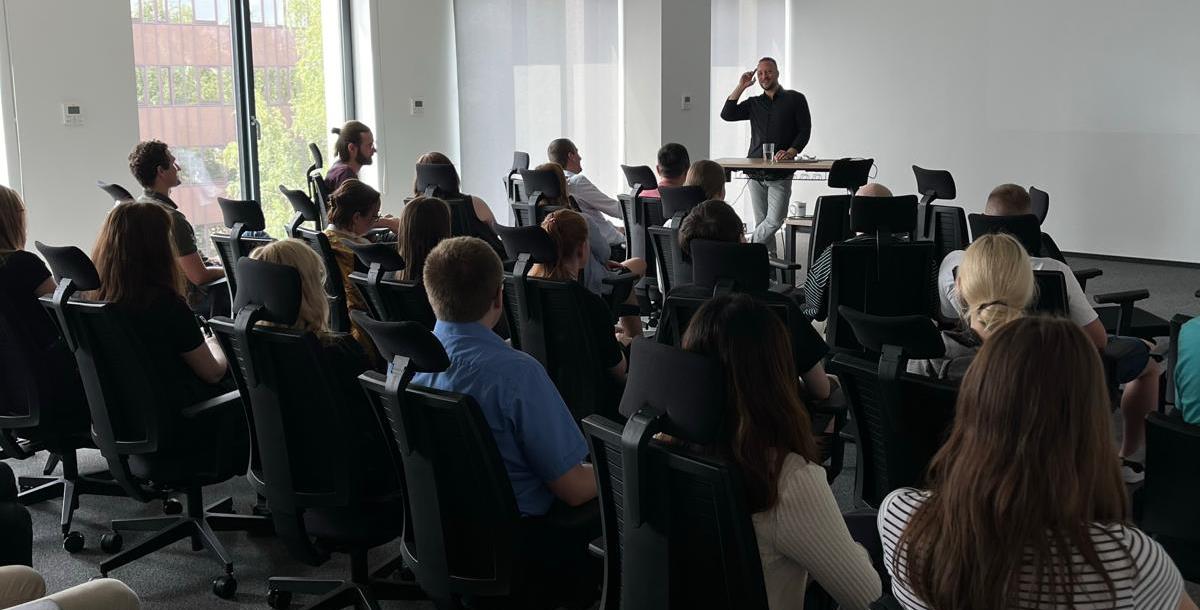
MDPI in Poland: Krakow Office
In July, I had the pleasure of visiting our Krakow office, following my recent trip to Warsaw to meet with the Polish Ministry of Science and Higher Education.

During these visits, I prioritized meeting with our Office Manager, Editorial Director, Group Leads, and members from various teams, including editorial, production, marketing, and journal relationship specialists, to understand their roles and current challenges. Instead of a formal presentation, I opted for an open discussion, sharing updates from headquarters to engage with colleagues in a more personal way.
Our Krakow office has many things to be proud of, including a large number of PhD colleagues (over a third of its staff holds a PhD degree). Krakow provides an opportunity for expanding beyond the 100 colleagues we currently have, by adding new hires in departments including editorial, production and marketing, among others.
About our Krakow office
- Opened in 2020
- 99 staff members as at 1 August 2024
- Main Departments include Editorial, Production, English Department, JRS, PR
Our Krakow office participates in international conferences, conducts author trainings and scholar visits, and engages in local market outreach. The office is also a member of the Polish Chamber of Commerce for High Technology (IZTECH) and is working on expanding its local engagement.
Krakow is the second-largest city in Poland, with a population of about 800,000. It also has a large student population of around 128,000, with seven universities. This means that roughly one in every eight residents is a student.
Poland and MDPI

Poland is a crucial market for MDPI. From 2020 to June 2024, Poland ranked 7th in submissions and 5th in publications for MDPI research articles. As at 31 July 2024, Poland ranks 7th in total MDPI publications, with approximately 70,000 research papers.
Between 2020 and June 2024, 61,500 authors from Poland published with MDPI. As at 30 June 2024, there are 1,205 active Editorial Board Members (EBMs) from Poland, with 661 EBMs (55% of the total) having an H-index over 25.
We also have four Editors-in-Chief (EiC) from Poland leading our journals: Coatings, Venereology, Advances in Respiratory Medicine, and Limnological Review, along with six Section EiC.
In 2023, we received approximately 21,000 submissions from Polish-affiliated authors, of which 12,032 were published.
“Poland is a crucial market for MDPI”
Meeting with Ministry of Education

On 22 July, we visited Warsaw to meet with the Polish Ministry of Science and Higher Education.
We were pleased to learn that they are strong supporters of the OA publishing model and value MDPI’s approach to the peer-review process, including our high ethical standards for quality control.
In 2023 Polish authors predominantly published their papers in OA, with MDPI holding the largest market share in OA publications within the country.
Our commitment to collaborating with Polish institutions is evident through our 33 Institutional Open Access Program (IOAP) agreements with prestigious institutions such as the University of Warsaw, the University of Wroclaw, the Jagiellonian University, and Gdańsk University of Technology. Through IOAP discounts, a healthy waiver rate, and our peer-review voucher system, we provide the Polish scholarly community with significant savings in OA publishing. The Minister greatly appreciated these efforts and our commitment to offsetting some of the APC costs.
We discussed industry concerns about the threat of papermills and presented the preventive measures MDPI has in place to mitigate this risk and uphold high ethical standards. We informed them of our commitment to combating papermills, including our involvement with United2Act and the STM Research Integrity Hub, as well as our efforts to expand our research integrity team and explore proactive measures.
Closing Thoughts

MDPI Thought Leadership Op-ed on Open Access is Now Live on Politico
I am pleased to share that our thought leadership Op-ed piece on Open Access (OA) is now live on Politico. This is a nice push for continued influence and support of OA among policymakers and industry leaders.
Why Politico?
Politico's reputation as a highly credible and influential news platform makes it an important venue to reach key opinion leaders (KOL) from academia, policymakers, and thought leaders from many industries. This visibility helps promote the OA philosophy.
Open Access: A Moral Imperative for Progress
In this piece, I discuss the necessity of making scientific research freely available to all. I argue that publicly funded research should be publicly accessible, highlighting how OA democratizes scientific knowledge, accelerates research availability, and fosters collaboration.
“Open Access is a fundamental right for all citizens”
Democratizing scientific communication
The impulse to democratize scientific communication is nothing new. OA may seem like a recent innovation, but its principles have historical roots traceable to Europe in the 15th century. Just as the printing revolution accelerated the dissemination of new ideas, OA publishing unlocks new scientific insights that would otherwise only be accessible to a few.
Benefits for scholars: amplifying impact through Open Access
Authors publishing in an OA journal can expect more citations of their work, increasing its potential impact. Research findings that are freely available are more likely to be cited than those hidden behind a paywall. Freedom of access greatly increases the potential audience for each paper, fostering a sense of community among researchers worldwide. Heightened visibility can attract prospective collaborators and employers for young scientists. At MDPI, we believe that all these factors can only accelerate the advance of science. Additionally, authors retain copyright in their work instead of signing it away, permitting broader dissemination under Creative Commons licenses and increasing its capacity for impact.
The moral imperative
OA is not just a matter of scientific policy; it is a fundamental right for all citizens and a prerequisite for a brighter, more informed future. Publicly funded research should be a top priority, and I am pleased to see policy moving in this direction. Our capacity to generate transformative scientific insights has to be democratized. The question today is no longer whether we can afford to embrace OA; rather, it is whether we can afford not to.
Chief Executive Officer
MDPI AG
2 August 2024
MDPI Romania Author Training Sessions in May
In May, MDPI Romania held three author training sessions – one endorsing an external event and two stand-alone sessions.
The National Session of Scientific Student Communications took place at Technical University Cluj on 17 and 18 May 2024. MDPI Romania sponsored this event and contributed an author training session on the production of research papers and case study analyses. JRS Norbert Kiss gave a presentation called The World of Open Access to explain different open access publishing models and the benefits of open access publishing. His presentation highlighted the impact of open access publishing on scientific progress and innovation.
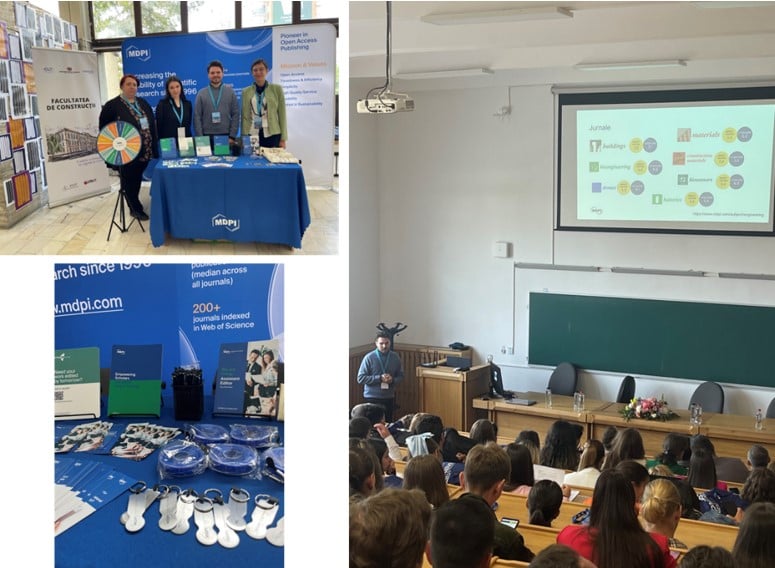
On 29 May 2024, MDPI Romania hosted an author training session for Ph.D. students, early career researchers, and professors at the Carol Davila University of Medicine and Pharmacy. In collaboration with Prof. Andreea Arsene, JRS Ioana Paunescu prepared two presentations: The Steps of the Publishing Process and Elaboration of a Peer Review Report. In her first presentation, she delved into MDPI’s history and mission, MDPI’s editorial process, and MDPI journals of various scopes that are accepting submissions. Her second presentation outlined the types of peer review, the contents of a peer review report by an MDPI reviewer, and the responsibilities of an MDPI reviewer.
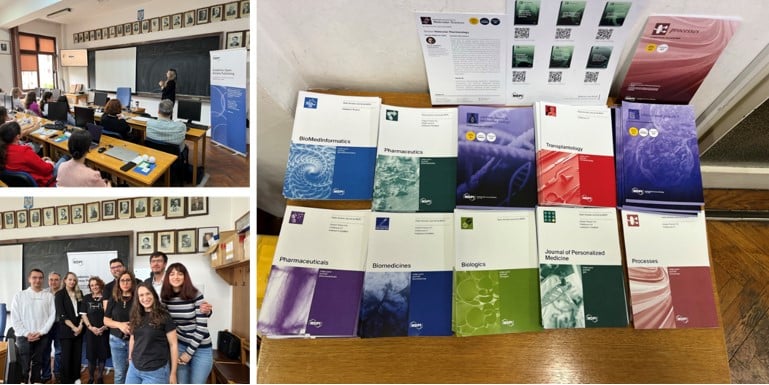
MDPI Romania also hosted an author training session at the Iasi University of Life Sciences on 29 May 2024. JRSs Laurentiu Preda and Cosmin Artan gave four presentations: Efficient Writing of an ISI-Indexed Scientific Article, Benefits of Publishing in the Open Access Model, Various Methods of Open Access Publishing, and MDPI Guide for the Article Review Process. The first three presentations offered guidance on how to improve academic writing, the fourth focused on how to write peer review reports. A highly interactive discussion followed the presentations, during which the JRSs provided extensive answers to attendees’ questions.
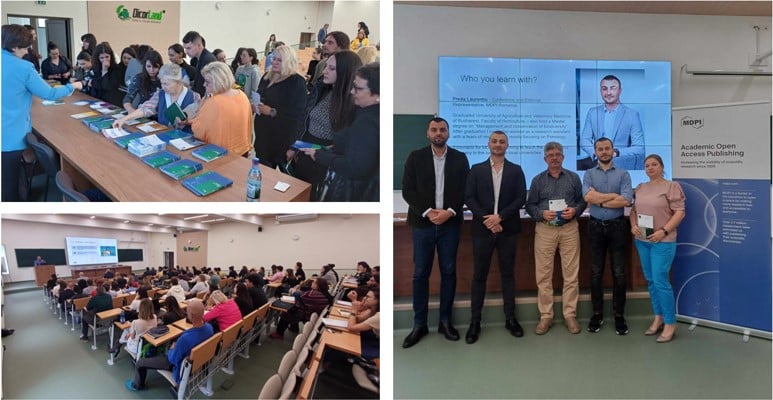
MDPI is grateful for all the attendees, speakers, and organizers involved in these events. Through their enthusiasm and dedication, these events were great successes.
2 August 2024
MDPI Webinar | World Breastfeeding Week 2024, 7 August 2024

In order to commemorate World Breastfeeding Week 2024, MDPI is launching a special webinar to encourage researchers to come together, take action, and highlight how the exchange of findings facilitates efforts to raise awareness on breastfeeding.
Breastfeeding plays a crucial role in the early development of infants, providing essential nutrients and antibodies that bolster the immune system and promote healthy growth. It fosters a strong bond between mother and child while reducing the risk of infections, allergies, and chronic conditions. Moreover, breastfeeding supports cognitive development and contributes to long-term health benefits, including lower risks of obesity and diabetes. For mothers, it aids post-partum recovery and reduces the risk of certain cancers. Promoting breastfeeding is vital for public health, ensuring the well-being of both infants and mothers and fostering a healthier future generation.
We are very much looking forward to seeing you at the MDPI World Breastfeeding Week Webinar 2024.
Date: 07 August 2024 at 03.00 p.m. CEST | 9:00 a.m. EDT | 9:00 p.m. CST Asia
Webinar ID: 839 4244 6710
Webinar Announcement: https://sciforum.net/event/MWBWW2
Register now for free!
| Speaker/Presentation | Time in CEST | Time in EDT |
| MDPI Introduction | 3:00 p.m.–3:10 p.m. | 9:00 a.m.–9:10 a.m. |
| Dr. Shela Hirani Breastfeeding during Emergencies: Challenges and Way Forward to Support Mothers in Disaster Zone |
3:10 p.m.–3:40 p.m. | 9:10 a.m.–9:40 a.m. |
| Dr. Sylvia H. Ley Role of Lactation in Cardiometabolic Health Consequences among Women |
3:40 p.m.–4:10 p.m. | 9:40 a.m.–10:10 a.m. |
| Dr. Natalie Shenker Developing the Milk Bank Services of the Future |
4:10 p.m.–4:40 p.m. | 10:10 a.m.–10:40 a.m. |
| Q&A Session | 4:40 p.m.–4:55 p.m. | 10:40 a.m.–10:55 a.m. |
| Closing of Webinar | 4:55 p.m.–5:00 p.m. | 10:55 a.m.–11:00 a.m. |
After registering, you will receive a confirmation email containing information on how to join the webinar. Registrations with academic institutional email addresses will be prioritized.
Unable to attend? Register anyway and we will inform you when the recording is available.
Keynote Speakers:
- Dr. Shela Hirani, University of Regina, Faculty of Nursing, Regina, Canada;
- Dr. Sylvia H. Ley, Epidemiology, Tulane University School of Public Health and Tropical Medicine, New Orleans, Louisiana, U.S.A.;
- Dr. Natalie Shenker, Department of Surgery and Cancer, Imperial College London, London, England; Human Milk Foundation, Gossoms End Health Centre, Hertfordshire, England.
Relevant Special Issues:
“Health Promotion and Interventions for Marginalized Mothers and Children”
Guest Editor: Dr. Shela Hirani
Deadline for manuscript submissions: 30 June 2025
“Anxiety and Depressive Disorders among Pregnant and Breastfeeding Women”
Guest Editor: Dr. Georgios Eleftheriou
Deadline for manuscript submissions: 30 September 2024
“Association between Breast Milk Composition and Neonates Growth”
Guest Editor: Dr. Maria Elisabetta Baldassarre
Deadline for manuscript submissions: 15 December 2024
“Breastmilk for Healthy Development”
Guest Editors: Dr. Monika Zielińska-Pukos and Prof. Dr. Jadwiga Hamułka
Deadline for manuscript submissions: 25 October 2024
“What’s New in Breastfeeding?”
Guest Editor: Dr. Patricia Markham Risica
Deadline for manuscript submissions: 25 October 2024
“Breast Cancer: New Diagnostic and Therapeutic Approaches”
Guest Editors: Dr. Erika Bandini, Dr. Tania Rossi and Dr. Sara Bravaccini
Deadline for manuscript submissions: 31 January 2025
“Molecular and Pharmacological Basis of Breast Cancer Resistance to Therapies”
Guest Editors: Dr. Stefania Crucitta and Dr. Rossana Roncato
Deadline for manuscript submissions: 30 November 2024
“Women’s Special Issue Series: Biomedicines (2nd Edition)”
Guest Editors: Dr. Letizia Polito, Dr. Federica Falà and Dr. Riuko Ohashi
Deadline for manuscript submissions: 15 December 2024
“Impacts of Newborn Breast Milk Feeding”
Guest Editors: Dr. Ivan Hand and Dr. Lawrence M. Noble
Deadline for manuscript submissions: 10 January 2025
“Infant Feeding: Advances and Future Challenges: 2nd Edition”
Guest Editors: Dr. Evangelia Antoniou, Dr. Maria K. Tzitiridou-Chatzopoulou and Dr. Eirini Orovou
Deadline for manuscript submissions: 20 September 2024
“Promoting Breastfeeding and Human Milk in Infants”
Guest Editors: Dr. Pasqua Anna Quitadamo and Prof. Dr. Luigi Corvaglia
Deadline for manuscript submissions: 1 March 2025
“2nd Edition: Pregnancy and Perinatal Health”
Guest Editors: Prof. Dr. Claude Billeaud and Dr. Virginie Rigourd
Deadline for manuscript submissions: 31 August 2024
“Nutritional Management of Newborn Infants”
Guest Editor: Dr. Maria Skouroliakou
Deadline for manuscript submissions: 27 November 2024
“Pregnancy, Childbirth, Puerperium, Breastfeeding and Sexuality in the World of Rare Diseases”
Guest Editors: Dr. Juan Carlos Sánchez-García, Dr. Raquel Rodríguez-Blanque and Dr. Jonathan Cortés Martín
Deadline for manuscript submissions: 30 September 2024
1 August 2024
Interview with Dr. Federica Laudisi—Winner of the Biomedicines 2022 Best Paper Award

We are pleased to announce that Dr. Federica Laudisi’s paper “Implication of Intestinal Barrier Dysfunction in Gut Dysbiosis and Diseases” has been chosen as one of four articles of exceptional quality published in the journal Biomedicines in 2022 and has won the Biomedicines 2022 Best Paper Award. As the award winner, Dr. Laudisi will receive CHF 500, a certificate, and a voucher granting a full waiver on the article processing charge (valid for one year).
The following is an interview with Dr. Federica Laudisi:
1. Could you please provide a brief introduction of yourself to our readers?
I am a mucosal immunologist, with strong expertise in human chronic inflammatory pathologies. After getting my Ph.D. in immunology in Rome at Sapienza University, I spent three years at the A*STAR-Singapore Immunology Network (SigN) in Singapore and one year at the Charitè Universitӓtsmedizin in Berlin. In 2015, I joined the laboratory of Prof. Giovanni Monteleone at the University of Rome “Tor Vergata”, focusing my research on gut inflammation and cancer. I am currently setting up my group here.
2. Could you please briefly introduce the main content of the winning paper?
This paper describes the importance of the intestinal epithelial barrier in maintaining gut homeostasis and ensuring the critical crosstalk between gut microbes (both commensals and pathogens) and the host’s immune system. We also describe potential alterations (either genetic or related to the environment) that may undermine such equilibrium, thus leading to gut dysbiosis. This pathological condition is now recognized to trigger the onset of several diseases, such as inflammatory bowel diseases and colorectal cancer. Indeed, targeting intestinal barrier dysfunctions represents a fascinating and challenging approach to treating gut-related diseases.
3. What is your current research and why did you choose this research field?
My research interests focus on the genetic, cellular, and environmental factors underlying chronic inflammatory bowel diseases, as well as mechanisms and inflammatory/neoplastic signals that sustain and amplify colon carcinogenesis.
4. Which research topics do you think will be of particular interest to the research community in the coming years?
I believe that research topics concerning microbiota targeting (including mycobiome and virome), as well as the host’s immune response modulation, may be of particular interest to the research community in the coming years since they are now considered a valuable and promising strategy to prevent and/or treat gut-related diseases.
5. What appealed to you about the journal that made you want to submit your paper? What benefits do you think authors can gain when publishing their articles in Biomedicines?
Biomedicines is a multidisciplinary journal that attracts a number of experts in different scientific fields. Therefore, in my view, this increases the visibility of your research among the research community. Moreover, the open access format, as well as the social media sharing, importantly contribute to disseminating your work.
6. How was your experience submitting to Biomedicines?
My experience submitting to Biomedicines was positive. The whole submission procedure was easy and clear to follow. I also appreciated the quickness of the revision since we received a first decision within two weeks, and this is a very important aspect to be considered in publishing scientific articles.
7. Can you briefly describe the key to a happy laboratory life? Have you ever encountered any difficulties conducting research and how did you overcome them?
I believe that the key to a happy laboratory life is to create a positive and balanced atmosphere in your teamwork. We are a group of scientists working together many hours per day and many days per year. We share successes and frustrations. Everyone is an important cog in the wheel, and it is not possible to reach ambitious goals without the help of your colleagues.
Sure, I have encountered many difficulties conducting research at every step of my career. We should not be afraid of failures and troubles; they are part of our lives. They make you stronger; they make your goals more defined and clearer. I try to be resilient and cultivate my passion for science, despite everything.
8. We are an open access journal. How do you think open access impacts the authors?
As I mentioned previously, being an open access journal gives a lot of advantages to the authors, since it helps to share your research more easily among the scientific community. Moreover, it allows low-income countries to read your work and take inspiration for further in-depth studies, thus helping the growth of the research community.
9. As the winner of this award, is there something you want to express or someone you wish to thank most?
I would like to thank the co-authors who helped me to conceptualize and draft this paper. A special thanks goes to Prof. Giovanni Monteleone. I am grateful for his support and guidance throughout my career.
More information about journal awards can be found at the following link: https://www.mdpi.com/journal/biomedicines/awards.
26 July 2024
Meet Us at the 46th ESPEN Congress (ESPEN 2024), 7–10 September 2024, Milan, Italy

A range of MDPI journals will be attending the 46th ESPEN Congress in Milan, Italy, from 7 to 10 September 2024.
ESPEN 2024 offers a great opportunity for physicians, dietitians, pharmacists, nutritionists, scientists and nurses involved in the field of nutrition and metabolism to meet and discuss cutting-edge science in an informal atmosphere, strengthening old and creating new collaborations.
The following MDPI journals will be represented:
- Nutrients;
- Medicina;
- Obesities;
- CIMB;
- Children;
- Metabolites;
- Biomedicines;
- Sci;
- Dietetics;
- Geriatrics;
- Women.
If you are attending this conference, please feel free to engage with us at our booth. Our delegates look forward to meeting you and answering any questions that you may have. For more information about the conference, please visit https://espencongress.com/ or contact the Nutrients Editorial Office at nutrients@mdpi.com.
19 July 2024
Meet Us at the 46th Congress of the Spanish Society of Biochemistry and Molecular Biology, 3–6 September 2024, A Coruña, Spain

MDPI will be attending the 46th Congress of the Spanish Society of Biochemistry and Molecular biology (46th SEBBM Congress), which will be held from 3 to 6 September 2024 in A Coruña, Spain.
The 46th SEBBM Congress will enjoy a wide range of plenary conferences, symposia, including the Hispanic-Luso Scientific Symposium and the Scientific Symposium of Education, meetings of the scientific groups of SEBBMs, poster sessions and the commercial exhibition of collaborating companies. We will be able to enjoy satellite activities such as the Research Initiation Course in Biochemistry and Molecular Biology, the Professional Development Forum for Young Researchers, and the activities of Biochemistry in the city, with exhibitions, scientific–artistic shows, round tables and scientific workshops.
The following MDPI journals will be represented at the conference:
- Cells;
- Biomolecules;
- CIMB;
- IJMS;
- Biomedicines;
- Organoids;
- Biology;
- BioTech;
- Biologics;
- Diagnostics;
- Medicina;
- BioMedInformatics;
- JMP;
- Genes.
If you are planning to attend the above conference, we encourage you to visit our booth and speak to our representatives. We are eager to meet you in person and assist you with any queries that you may have.
For more information about the conference, please visit the official website at https://congresos.sebbm.es/coruna2024/.
10 July 2024
MDPI's Newly Launched Journals in June 2024
 Five new journals covering multiple subjects have launched their inaugural issue in June 2024. We are excited to be able to share with you the newest research rooted in the value of open access.
Five new journals covering multiple subjects have launched their inaugural issue in June 2024. We are excited to be able to share with you the newest research rooted in the value of open access.
We would like to express our deepest appreciation to all the Editorial Board Members and each journal will ensure its high-quality output using excellent editorial and rigorous peer review processes, to ensure that the articles achieve high impact and visibility.
Please feel free to browse and discover more about the new journals below.
|
Journal |
Founding Editor-in-Chief |
Journal Topics (Selected) |
 |
Prof. Dr. Marco Ranucci, IRCCS Policlinico San Donato, Italy |
anaesthetic medications; blood and fluid management; pain management; critical care; critical illness | view journal scope | submit an article |
 |
Dr. Giovanni E. Cacciamani, University of Southern California, USA |
surgical/procedural complications; complications; perioperative adverse events; postoperative adverse events | view journal scope | submit an article |
 |
Prof. Dr. Gassan Hodaifa, Universidad Pablo de Olavide, Spain |
laboratory management; laboratory safety; protective equipment; laboratory problems and challenges; laboratory Innovation | view journal scope | submit an article |
 |
Prof. Dr. Jan S. Suchodolski, Texas A&M University, USA |
companion animals health and disease; veterinary care and nutrition; genetics and genomics; behavior and welfare; human-animal relations | view journal scope | submit an article |
 |
Prof. Dr. Pierfrancesco De Paola, University of Naples Federico II, Italy |
real estate appraisal; economic and financial valuation of real estate projects; sustainable real estate; housing and urban economics | view journal scope | submit an article |
We wish to thank everyone who has supported the development of open access publishing. You are welcome to send an application here, or contact the New Journal Committee (newjournal-committee@mdpi.com) if you would like to create more new journals.
2 July 2024
Biomedicines Receives an Updated Impact Factor of 3.9 and CiteScore of 5.2
We are pleased to share that Biomedicines (ISSN: 2227-9059) was awarded an updated Impact Factor of 3.9 in the 2023 Journal Citation Reports™ released by Clarivate in June 2024, ranking in Q1 (85 among 354 titles) in the “Pharmacology and Pharmacy” category.
Additionally, according to data released by Scopus (Elsevier), Biomedicines received an increased CiteScore™ of 5.2, showing an increase of 40.5% compared to 2022.
Biomedicines’ CiteScore ranks as follows:
- Q2 (103 out of 398 journals) in the “Medicine (miscellaneous)” category;
- Q2 (74 out of 221 journals) in the “General Biochemistry, Genetics and Molecular Biology” category.
|
3.92023 Impact Factor |
85/354 (Q1)Pharmacology and Pharmacy |
28,411Citations in 2023 |
|
5.22023 CiteScore |
64/189 (Q2)Medicine, Research and Experimental |
0.814SNIP |
For further statistics, please visit https://www.mdpi.com/journal/biomedicines/stats. For more information about MDPI flagship journals' citation metrics, please see here.
At MDPI, our mission is simple, yet powerful—we strive every day to make scientific research freely accessible to everyone, everywhere. With over 3.5 million authors choosing MDPI, we have established ourselves as a key player driving the open access initiative.
Our journals have received over 13 million citations in the Web of Science, making us the most cited open access publisher. With over 800 institutional partners, MDPI continues to demonstrate its dedication to providing reliable and collaborative publishing services.
Biomedicines Editorial Office




